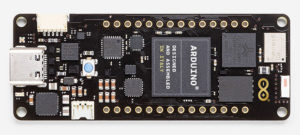Foundries.io and Arduino are joining forces to make embedded Linux-powered internet of things and edge computing devices more secure. Foundries.io announced the partnership Thursday.
The deal will combine technological innovations with Foundries’ cloud-native development and deployment enterprise solutions for secure IoT and edge devices. Those solutions will integrate with the Arduino Pro Portenta X8 release, also announced Thursday.
Arduino is an open-source electronics company that manufactures open hardware development boards used by millions of developers around the world. Arduino will use the FoundriesFactory cloud platform in its enterprise product.
The combination will help customers ease development and deployment, reduce costs, and accelerate revenue associated with industrial IoT and edge devices.
The IoT market will more than double in the next five years. Industry watchers predict the market for edge devices will nearly triple with accelerated growth expected in industrial IoT, electric vehicle infrastructure, and robotics.
A few years ago, Arduino invented a new category of products by combining microcontrollers and microprocessors on a single hardware platform. Now, it is providing enterprises the same flexibility with performance on steroids from Portenta X8’s 4x Cortex-A53, Cortex-M7 and 2x M4 processors, said Fabio Violante, CEO at Arduino.
“Foundries.io is in a unique position to advance Arduino’s vision for enabling enterprises to more easily deploy and maintain Linux-based products for IoT and Edge applications,” said George Grey, CEO at Foundries.io.
Meeting the Security Challenge
Among the challenges to realizing this growth and innovation for businesses are the security of these devices and the expense associated with building and maintaining Linux to support them. FoundriesFactory addresses these challenges with a cloud-based DevOps service to build, test, deploy and maintain these devices.
“Today, the world is different. You cannot think about a Linux-based device without anticipating the challenges of securing and maintaining it over time. This requires expertise, commitment, and attention to every detail related to security and maintenance,” said Arduino’s CEO.
His company decided to partner with Foundries.io to simplify this approach by providing a ready-to-use solution that can help customers build systems with confidence. By embedding a FoundriesFactory in the Arduino platform, customers can be sure to choose the best solution on the market, he added.
Some recent reports cite that many smart home devices from major manufacturers appear to be using old versions of OpenSLL to handle encryption data, according to Tyler Baker, CTO at Foundries.io. Those have known vulnerabilities that could lead to malicious actors accessing data from the devices.
Applying modern security best practices for monitoring vulnerabilities, remediating and maintaining software in embedded systems, is overdue, stated Kate Stewart, VP for dependable embedded systems and SPDX Project co-founder at The Linux Foundation.
“Foundries.io has been focused on bringing an effective solution to this problem to the market, and the partnership with Arduino has the potential to introduce a new option for making these systems more dependable over time at scale,” she told LinuxInsider.
Taking Off the Edge
Edge computing does not have security issues to the same degree as IoT, said Baker. Defacto standard Linux platforms, such as RedHat, include infrastructure and services necessary for secure device management and over-the-air updates.
“Foundries.io is the only vendor currently who is delivering a similar Linux platform for IoT,” he told LinuxInsider.
Another benefit to the twin-company partnership is IoT developers no longer need expertise in Linux, security, or cloud-based device management to build powerful edge devices. Until now leveraging the power of processors running Linux at the edge was almost prohibitively difficult for many organizations.
“Thanks to this collaboration, IoT workloads will no longer be confined to the cloud with the limitations and latencies that the cloud brings. Now anyone can deploy powerful edge processing capabilities to power their IoT workloads,” Baker explained.
How It Works
The combination of the Portenta X8 and the FoundriesFactory cloud solution will accelerate customer time to market. It will also increase product security and enable rapid deployment and lifetime over-the-air (OTA) management of customer devices and fleets.
At the same time, the solution will bring freedom of choice for connectivity to public or private cloud services. Those choices include off-the-shelf solutions to fully customized options.
“The partnership creates an industry-leading solution for Linux-based IoT and Edge products, Foundries’ Grey asserted.
The technology is built around a fit-for-purpose, customizable Linux microPlatform OS designed using best industry practices for security and incremental OTA updates. Developers can build with the freedom open-source software supports. Businesses achieve lower costs and reduced time to revenue.
Users will be able to access a FoundriesFactory for the Portenta X8 hardware platform. This will enable users to immediately connect Arduino Portenta X8-based products to the cloud and start developing container-based applications, leveraging the device management and DevOps capabilities available with FoundriesFactory.

























































